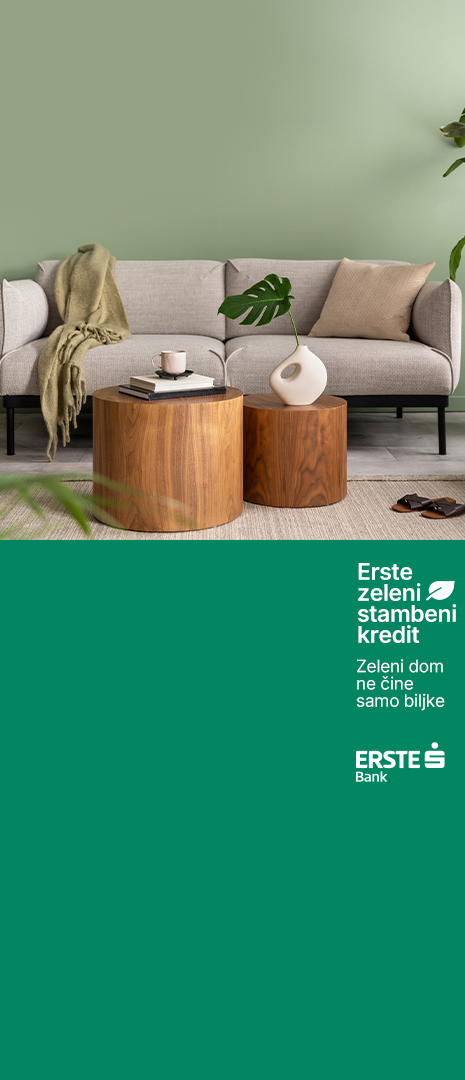Vedrana Likan, director at Colliers - BiH has a strong potential for a logistics center due to its favorable geographical location
Vedrana Likan (Photo: Sanjin Kaštelan)

- Tourism is a growing industry in BiH, but international hotel brands are poorly represented on the market. By 2026, the hotel offer should be expanded with two new Hilton hotels - one in Sarajevo and one in Mostar - which will mark the entry of the Hilton brand on the BiH market. The modernization of the transport infrastructure is an important prerequisite for further development of logistics.
Likan explains to us that the key obstacles to the further development of the real estate market in BiH are the complex legislative framework, slow issuance of building permits, political instability and fragmented search area. Also, she points out that the lack of transparency on the market makes it difficult for potential investors to make informed decisions.
- At the same time, it is expected that the current status of a candidate country for membership in the European Union will have a positive effect on the economy through pre-accession funds and reforms required for accession to the European Union.
Recently, there has been news that vacant real estate could be taxed in BiH. The first that could introduce this tax is the Sarajevo Canton, and as Prime Minister Nihad Uk pointed out, the goal of creating the new law is to lower the price of housing. What are your thoughts? Can this move affect the lowering of prices?
- The subject of taxation of empty real estate is relevant in neighboring Croatia as well. The idea of the tax policy is to encourage owners to sell or rent vacant real estate, which would, in an ideal scenario, increase the supply of real estate on the market. However, the real estate tax as an isolated measure that is not part of the overall tax reform and housing strategy cannot be sufficient for regulating and stabilizing the housing market. On the other hand, such topics and discussions in the public space are stimulating because they indicate that the problem of housing is being thought about and that efforts are being made to find a solution to increase the supply of housing and housing affordability.
Affordable housing will be one of the main priorities of the new mandate of the European Commission, considering that in the last ten years, real estate prices have increased by 49%, and rents by 24% at the EU level. Next, China will increase the amount of funds in the housing area to stabilize the real estate market. Can our region expect similar measures soon?
- We are already seeing activities in that direction in Croatia. Namely, on October 18, 2024, the Government presented the first National Housing Policy Plan of the Republic of Croatia until 2030, which has three goals - affordable housing, sustainable housing and space in the function of housing, and it is estimated that EUR 1.2 billion will be needed to implement the policy. It remains to be seen how the implementation will proceed and whether it will achieve the desired results.
In BH, the issue of abolishing VAT on the purchase of the first real estate is also current. This measure gave good results in Serbia. When do you think citizens of BiH can expect these benefits?
- Announcements about the abolition of VAT on the purchase of the first real estate were updated last year, and the implementation of that measure depends primarily on political will, so that this relief can be expected when a political consensus is reached. It is important to emphasize that VAT is an indirect tax, which means that its abolition would not necessarily result in a proportional decrease in the price of a square meter of an apartment.
The increase in the price of construction materials, the lack of labor, higher hourly wages, all of this affects high real estate prices. However, how expensive is a square meter when most of the apartments are sold while they are still under construction?
- The increase in the price of construction materials, the lack of labor and the increase in hourly wages certainly contribute to high prices per square meter. In addition, the price of an apartment is influenced by economic growth, the cost of financing, the availability and price of construction plots in desirable locations, the speed of issuing building permits and the arrival of new square meters on the market, as well as various grants to the state and/or local self-government that are an integral part of the process of building residential buildings.
From the buyer`s point of view, let`s not forget that high inflation in recent years has also affected demand, since some citizens have decided to buy residential real estate in order to preserve the value of their property in conditions of high inflation.
The fact that a large number of apartments are sold while still in the construction phase indicates a high demand, and the question arises of how to respond to the obvious disparity between supply and demand and accelerate the arrival of more square meters on the market.
(Photo: Sanjin Kaštelan)

Answer the question, which interests many - what real estate prices can we expect in the future?
- It is always ungrateful and risky to project the price movement of residential real estate because the price depends on several factors, such as the pound, demand, location, macroeconomic conditions, prices of construction plots, materials and labor. A price correction is possible for residential real estate that is less attractive and overpriced, but in the near future we do not expect a drastic drop in the prices of new construction in major cities.
To what extent are foreign investors interested in the real estate market in BiH? What changes in the legal framework could further encourage foreign investments in this market?
- The economy of Bosnia and Herzegovina faces challenges due to the disunited internal market and a significant share of the gray economy. In such a macroeconomic environment, the biggest challenge for investors is the perceived risk of the country, which is why the commercial real estate sector of Bosnia and Herzegovina is still an underdeveloped market.
Considering the market size and the investment opportunities, which average between EUR 5 and 15 million, BiH is more attractive to regional and local investors compared to the big global players. Among foreign investors, the most active investors on the market are those from the Middle East. BiH still has a long cycle of investing in the commercial real estate market, which should not be seen as a weakness, but as an opportunity for growth, development and strengthening of the business environment in the country.
Which areas or regions in Bosnia and Herzegovina do you consider to be the most promising for future real estate investments?
- The most promising areas for investments are Sarajevo and its surroundings due to its status as the capital, and Banja Luka, as the main center of Republika Srpska. Also, Mostar has development potential due to its favorable geographical position and increasing tourist attractiveness.
How do regional real estate markets, such as Serbia and Croatia, influence the dynamics of the market in BiH? Are there any shared trends?
- Colliers has been present on the Croatian market for 20 years now, and based on our long-term experience in Croatia, as well as our presence on the BiH market, we can conclude that the Croatian commercial real estate market is more developed. We do not notice as a rule that once an investor or developer enters the Croatian market, expansion into the market of Bosnia and Herzegovina follows quickly.
For example, logistics is currently a very propulsive and fast-growing sector in Croatia. In Bosnia and Herzegovina, the logistics sector has not yet experienced such expansion as in Croatia, although BiH has a strong potential to establish itself as a logistics center due to its favorable geographical position. However, in order to achieve this, several key preconditions must first be met, primarily the modernization of the road and railway infrastructure. Therefore, we can say that the trends from Croatia to Bosnia and Herzegovina are generally transferred to a limited extent and with a time lag.
What is the role of green and sustainable construction projects in the development of the real estate market in the region? Do you see any progress in that direction?
- Although green and sustainable construction projects on the real estate market in BiH are still in the early stages of development, there are visible moves in that direction. Namely, today global companies looking for premises for lease expect highly energy-efficient buildings, and real estate owners should strive to offer such properties on the market. Therefore, the increased interest in energy efficiency and environmental sustainability is gradually coming into focus during the development of new projects. In addition to the development of new projects, ways to improve existing properties will be sought in order to become more energy efficient and sustainable.
On the other hand, meeting environmental standards can be an expensive process, which could be a challenge in markets like BiH, where smaller business entities are often price sensitive and face significant budget constraints in business. For this reason, it will be necessary to find a balance between cost-effective solutions and meeting the growing regulations and trends related to sustainability.
Slobodana Šubara

Click here to see the entire Special Edition Newsletter
"Real Estate & Construction - Market-changing investments"
Back to newsletter










































